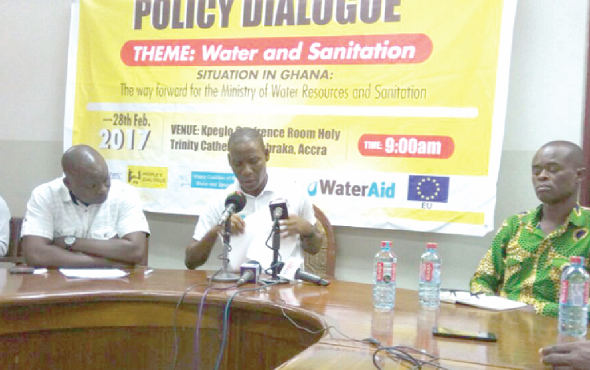
Tackle challenges in water, sanitation sector — CONIWAS
Members of the Coalition of Non-Governmental Organisations (NGOs) in Water and Sanitation (CONIWAS) have called for clear-cut initiatives to promote solid waste separation, treatment and re-use in the country.
Advertisement
The coalition observed that currently, the most common practice was the dumping of both solid and liquid waste at landfill sites.
They are, therefore, entreating the government to partner private companies to come up with initiatives to improve on the sanitation situation in the country.
New ministry
At a press conference in Accra, the spokesperson for CONIWAS, Mr Benjamin Lartey, commended the government for creating a new ministry for water and sanitation.
“We believe that the creation of the Water and Sanitation Ministry is a very welcome political decision by the President. This will create harmony among the sectors and also attract the greatest attention at the highest political level,” he stated.
According to the 2014 Ghana Living Standards Survey, more than 62 per cent of households in Ghana drink water from sources contaminated with faecal matter while only 15 per cent of households use improved household toilets.
More than five million people, Mr Lartey said, practised open defecation due to absence of toilets at home.
Funding
According to him, even though more than 80 per cent of households in low income communities have expressed interest in installing toilet facilities in their homes, they lacked financial support such as soft loans and grants. “There is currently no clear funding mechanism for household toilets,” he said.
Mr Lartey indicated that in 2010, the government made a commitment to invest at least U$200 million annually in water and sanitation and a further U$150 million per annum towards hygienic treatment and disposal of sewage and faecal sludge as well as sullage and storm-water management in the country.
The government further pledged to make allocations up to the minimum threshold of 0.5 per cent of GDP to cover capacity building for hygiene education including proper hand-washing methods, country-wide outreach of Community-led Total Sanitation (CLTS) and general enhancement of enabling elements.
However, those commitments which were made to the Sanitation and Water for ALL (SWA) Global Partnership in 2010 had not yet been honoured while the requirement in the National Environmental Sanitation Strategy and Action Plan to set up a Sanitation Fund had also not been implemented.
Enforcement
Mr Lartey further called for the enforcement of laws on environmental sanitation.
“People defecate in the open and litter about anyhow without punishment. And one of the most critical environmental issues, such as illegal mining, is killing most of our freshwater resources,” he added.
The group, therefore, urged the new Sanitation and Water Resources Ministry to tackle the root causes of the challenges facing the sanitation and water sector which included non-prioritisation, weak institutional capacities and research into modern technology options, and poor documentation and information management.




